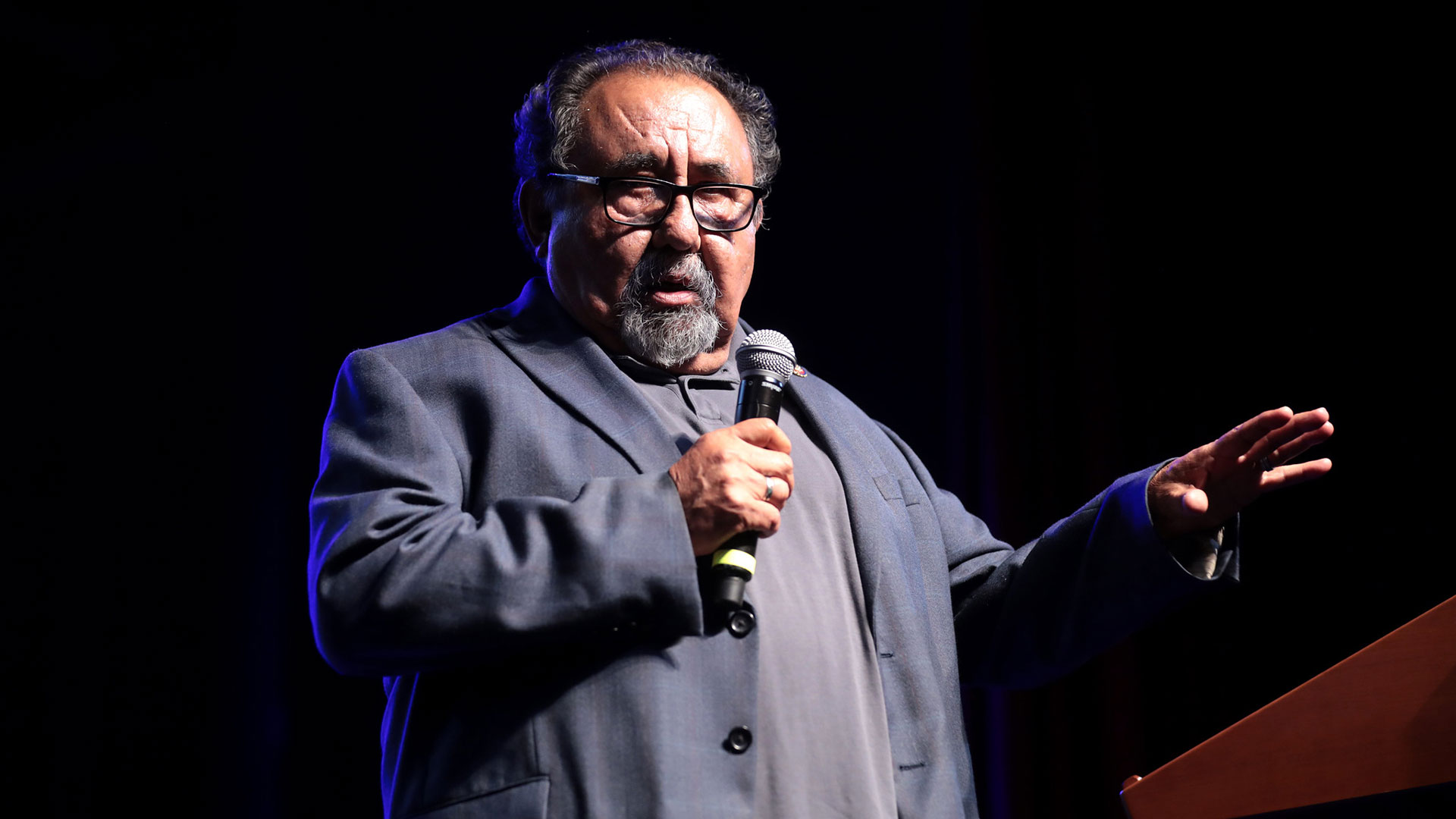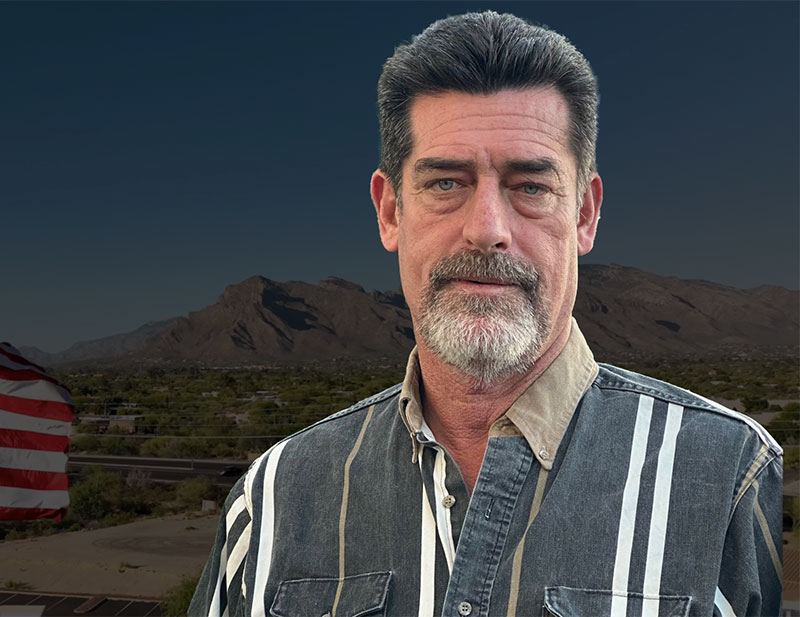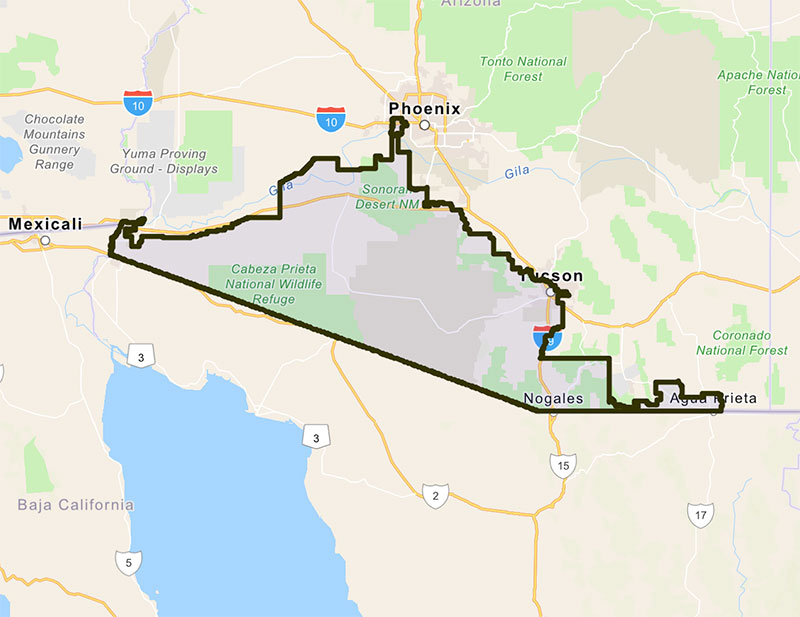 U.S. Congressman Raul Grijalva speaking with supporters of U.S. Senator Elizabeth Warren at a town hall at the Marquee Theatre in Tempe, Ariz., on Aug. 1, 2019.
U.S. Congressman Raul Grijalva speaking with supporters of U.S. Senator Elizabeth Warren at a town hall at the Marquee Theatre in Tempe, Ariz., on Aug. 1, 2019.
Arizona’s 7th Congressional District covers nearly all of the Arizona-Mexico border and extends up to the western suburbs of Phoenix. It has also consistently sent Democrats to the House of Representatives since 2002, even though the area has gone through two rounds of redistricting in that time.
Daniel Butierez is the latest Republican challenger to the 22-year Democratic incumbent Raúl Grijalva.
Both candidates running in the Southern Arizona district echo the topics that seem to be defining the 2024 election cycle; the border, and the cost of housing.
They’re both referred to collectively as “crises” in the area. Republican Butierez said if he’s elected, he’d advocate to continue building the border wall.
“It's got nothing to do with us not wanting migrants to come here. It's got to do with knowing who's coming here and stopping the drugs from pouring across our borders,” he said.
 VIEW LARGER Daniel Butierez is the Republican candidate for Arizona's 7th Congressional District.
VIEW LARGER Daniel Butierez is the Republican candidate for Arizona's 7th Congressional District. Grijalva called the border wall “the stupidest thing we could do.”
“What’s the wall going to do? It’s a symbol of something that’s not a reality,” he said.
Even as two bipartisan immigration bills failed to pass this spring, Grijalva said he wants another term to continue the immigration reform which is currently at a standstill.
“This Republican Congress has said no to DACA. It has said no to any step toward any limited immigration reform,” Grijalva said. “It is the first effort that, in the 20 years I've been there, to try to reach a compromise. And so my strategy now is, let's get what we can get, and let's try to move this ball forward.”
According to his website, Butierez is a contractor and owns two small businesses; a painting company and a rescue horse property that employs individuals who have just been released from prison.
Butierez spent almost 10 years in prison, and according to a court document listed on his website, a judge ruled that charge from 1992 void in 2020. He spent 2.5 years on the streets after his release, and he said that experience makes him especially ready to solve the housing crisis, which he says is tied to rampant drug use on the streets.
“Our society has no accountability. No one's held accountable for their actions,” he said. “You can get them off drugs and then release them back out in the streets, and because you haven't given them their self-esteem, they don't have a purpose in life, they return back to the drugs,” he said.
Getting a job in prison helped Butierez get back on his feet, and he thinks a large-scale work program will create a similar “mindset shift” to solve the housing crisis.
“We need a program where a judge says, ‘Okay, listen, we got a program you can enter. You complete this program, and we will drop these charges, and you can go start a new life, or you can sit here in jail until you go to court.’ Most of them will choose the program. And let me tell you, when a guy's locked up and they get to go out and go to work, they are really good workers, because they don't want to lose that job.”
Butierez said empty prisons would be used to house homeless people in his planned work program.
 VIEW LARGER A map of Arizona's 7th Congressional District.
VIEW LARGER A map of Arizona's 7th Congressional District. Grijalva said a similar work program would criminalize homelessness.
“Homelessness is not a crime. It is unworkable, and practically speaking, is not a solution to the crisis that we're dealing with,” Grijalva said.
Instead, the incumbent said the government must also provide more low-income housing while working to control inflation.
“We have to provide programs, rental and permanent housing programs that are affordable and accessible to people,” he said.
With over two decades in Congress under his belt, one thing that feels different in this year’s campaign for Grijalva is personal. He recently wrapped up treatment for cancer, and announced if he’s elected for a twelfth term, it will be his last.
“I think it's increased my determination, and I think it's increased the urgency of what I do. because, you know, you can't take this stuff for granted,” he said.
Butierez says Grijalva’s health issues should be concerning to voters.
“He hasn’t represented us since February, and that’s because his cancer is getting worse. It’s not getting better,” he said.
Grijalva says he is doing well, and that he is just one of thousands of Arizonans dealing with a serious illness.
“I feel that I’m more intelligent and more capable than my opponent, and I shouldn’t be eliminated, nor should anybody be eliminated from seeking public service simply because I’ve been sick. What’s the problem?” he said.
According to campaign finance reports from the Federal Election Commission, Grijalva has over $350,000 on hand. Butierez has just over $1,500.
July’s voter number for District 7 showed that Democrats outnumbered Republicans nearly 2 to 1. Voters with no party affiliation are the second largest group in the district.
Early voting ballots are mailed in Arizona on Oct. 9.

By submitting your comments, you hereby give AZPM the right to post your comments and potentially use them in any other form of media operated by this institution.